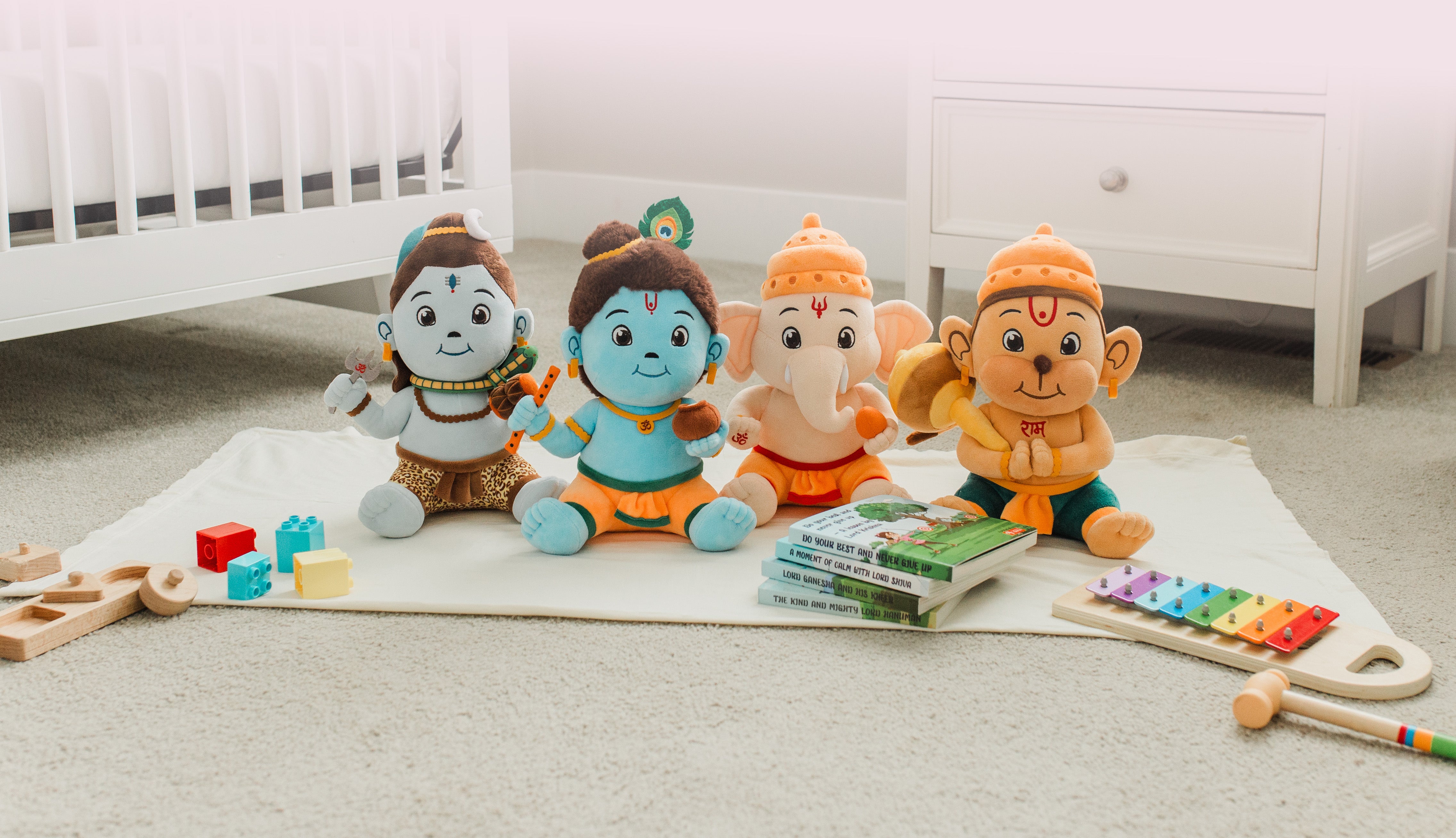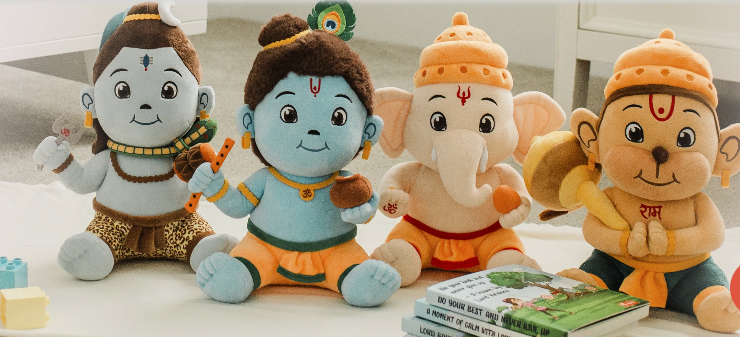Introducing Children to Hindu Deities Through Play
In today’s global and multicultural world, introducing children to their heritage is more than a tradition—it's a foundation for identity, self-worth, and spiritual growth. For parents and educators seeking meaningful ways to connect children with Hindu traditions, Hindu deities for kids are emerging as a beautiful, playful solution. Through soft plush toys and guided storytelling, little ones can learn about their rich spiritual legacy in a way that feels joyful and accessible.
One brand that exemplifies this innovative approach is Cuddly Gurus, a company that creates plush toys modeled after beloved Hindu deities, combining educational play with cultural and spiritual learning. These toys serve as interactive tools that spark curiosity, build faith, and encourage mindful learning in children.
Why Teaching Hindu Deities to Children Matters
Spiritual traditions shape character, influence behavior, and nurture empathy in young minds. Introducing children to Hindu deities early offers them a foundation in values like compassion, resilience, truthfulness, and humility—virtues personified by gods like Krishna, Ganesha, and Durga.
Key Benefits of Introducing Hindu Deities Early:
|
Benefit |
Description |
|
Cultural Identity |
Encourages pride and connection to one’s heritage |
|
Moral Framework |
Provides role models that teach values like kindness, discipline, and courage |
|
Emotional Intelligence |
Stories about deities help children process feelings and build empathy |
|
Spiritual Curiosity |
Lays the foundation for deeper spiritual understanding in later life |
Plush Toys as Powerful Educational Tools
Plush deity toys are more than just adorable—they are tangible, approachable representations of complex divine figures. For early learners, plush toys offer the perfect mix of educational play and emotional bonding.
Why Plush Toys Work:
-
Tactile Learning: Young children learn through touch. Holding and cuddling a plush Ganesha or Krishna engages their senses and builds emotional connection.
-
Symbol Recognition: Repeated exposure to deity forms familiarizes children with spiritual symbolism in an age-appropriate way.
-
Storytelling Catalyst: These toys act as props for storytelling, a powerful technique for conveying complex moral lessons in simple formats.
-
Comfort and Companionship: Children bond with plush toys emotionally, treating them like friends—building early spiritual relationships.
The increasing popularity of Hindu deities for kids in plush form shows a growing desire among modern parents to integrate tradition with developmental science.
Integrating Hindu Deities into Early Learning Environments
Whether at home or in a classroom, plush deity toys can serve as entry points for engaging activities. By embedding spiritual elements into structured learning, children begin to view their faith as part of everyday life, not just ritual.
Creative Ways to Integrate Hindu Deities for Kids:
-
Daily Rituals
Start or end the day with a short prayer or story involving the deity. Children can hold the plush toy during the ritual to feel more involved.
-
Storytime Sessions
Use plush toys to act out stories like Krishna stealing butter or Ganesha's elephant head origin. This encourages interactive learning and strengthens memory retention.
-
Craft Activities
Encourage kids to draw or color depictions of their favorite deity. Then, compare their art to the plush toy and talk about the deity’s attributes.
-
Songs and Chants
Simple bhajans or mantras linked to the plush toy can reinforce pronunciation, rhythm, and meaning.
-
Show-and-Tell
Encourage kids to bring their plush deity to school and explain who it is. This builds confidence and promotes cultural toys as mainstream.
Encouraging Spiritual Growth Through Play
Spirituality is not just for grown-ups. Children are naturally curious about life’s big questions—why we exist, what is right or wrong, and how to be a good person. Learning about Hindu deities for kids helps them explore these ideas gently.
Deities as Moral Guides
|
Deity |
Key Value |
Teaching |
|
Ganesha |
Wisdom & New Beginnings |
Teaches children to overcome obstacles with patience and intellect. |
|
Krishna |
Joy & Devotion |
Encourages love for truth, playfulness, and deep faith. |
|
Hanuman |
Strength & Service |
Embodies loyalty, courage, and devotion to duty. |
|
Durga |
Empowerment |
Inspires children to stand up against fear and protect what’s right. |
These teachings foster emotional and spiritual intelligence, guiding children through everyday challenges with divine inspiration. It’s especially effective when the lessons are paired with interactive learning tools like plush deities.
The Role of Cultural Toys in Identity Formation
In a world where screen time is rising and cultural references are diluted, cultural toys act as anchors. They offer children a way to connect with their roots and celebrate what makes their heritage unique.
How Cultural Toys Help Shape Identity:
-
Representation Matters: Seeing one’s faith represented in toys builds confidence and pride.
-
Bridging Generations: Grandparents can use plush toys to tell age-old stories, passing on tradition in a fun and memorable way.
-
Safe Exploration: Children feel safe asking questions and making sense of traditions when learning is informal and playful.
Supporting Parents and Educators in Faith-Based Learning
Parents and educators often wonder: how do I make spiritual learning fun, not forceful? The answer lies in using tools that are developmentally appropriate and emotionally resonant.
Tips for Parents:
-
Use plush toys to start conversations about festivals, virtues, and family traditions.
-
Let children ask questions freely—guide them gently with stories and symbolism.
-
Keep deity toys visible around the house so spiritual learning becomes part of daily life.
Tips for Educators:
-
Incorporate deity plush toys in lesson plans about global religions and cultures.
-
Promote inclusivity and diversity by encouraging children of all backgrounds to engage with the stories.
-
Foster open-minded discussions about different values and perspectives.
Where to Find Quality Plush Hindu Deities
Not all plush toys are created equal. It’s important to choose high-quality, culturally respectful, and age-appropriate toys that children can love and learn from.
Cuddly Gurus offers a unique collection of plush toys representing Hindu deities like Ganesha, Krishna, Hanuman, and Durga. Each toy is thoughtfully designed with:
-
Authentic features that reflect the deity’s traditional iconography
-
Soft, durable materials perfect for children ages 2 and up
-
Storybooks and accessories that add depth to the learning experience
The toys from Cuddly Gurus aren’t just cuddly companions—they're educational tools for early learning, designed to instill love, faith, and cultural literacy from a young age.
Nurturing Values That Last a Lifetime
Introducing Hindu deities for kids through play is not about indoctrination—it’s about laying a strong emotional, cultural, and spiritual foundation. In a world that often prioritizes speed over substance, this method encourages children to grow up mindful, curious, and rooted in values.
Plush deity toys like those from Cuddly Gurus offer a bridge between modern parenting and ancient wisdom. They make abstract spiritual concepts relatable, engaging, and age-appropriate. Whether you’re a parent looking to enrich your child’s early years or an educator aiming to promote diversity in learning, these tools offer a meaningful place to begin.
FAQs
1. At what age can children start learning about Hindu deities through plush toys?
Most plush toys designed to teach about Hindu deities are safe for children aged 2 and above. However, the storytelling and educational depth can be adapted for toddlers to pre-teens.
2. How can I make deity-related storytelling engaging for my child?
Use animated voices, props like plush toys, and include your child in the narrative. You can also align stories with current events or emotions your child is experiencing for better resonance.
3. Are plush deity toys appropriate for use in classrooms?
Yes. Plush deity toys are excellent for promoting religious literacy, cultural diversity, and moral learning in early education settings. Just ensure they're introduced with context and sensitivity.

